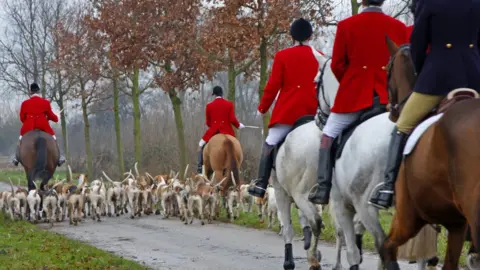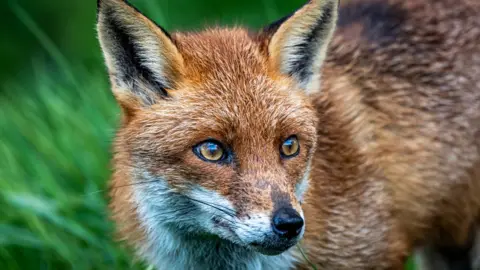New Scottish bill to limit hunting with packs of dogs
 Getty Images
Getty ImagesHunters will no longer be able to use packs of dogs to flush out wild mammals unless they have a licence, under a new Scottish government bill.
The Hunting with Dogs Bill will replace legislation in the Protection of Wild Mammals (Scotland) Act 2002 - which made fox hunting illegal.
Ministers said it would make the law clearer and close loopholes.
However the Scottish Greens, the SNP's partners in government, said the bill risked opening another loophole.
Much like the Protection of Wild Mammals (Scotland) Act, the new bill allows for predators like foxes to be controlled in certain circumstances, including preventing serious damage to livestock, timber or crops, protecting human health or preventing the spread of disease.
Dogs have to be kept under control and permission has to be granted from the land owner in these scenarios.
The key change is that no more than two dogs can be used to flush out animals like foxes or hares unless a licence has been granted.
 Ian Douglas/Getty Images
Ian Douglas/Getty ImagesThe bill also includes new provisions to ban trail hunting - which involves people on foot or horseback following an artificial scent along a pre-determined route with hounds or beagles.
The National Trust stopped issuing licences for trail hunts on its land in November last year after footage emerged of a prominent huntsman advising how to use them for covert illegal fox hunts.
Environment Minister Màiri McAllan said the Scottish government had consulted widely on its proposals, with a public consultation receiving more than 11,000 responses.
She said: "I want to make clear that chasing and killing a mammal with a dog, for sport or otherwise, has no place in modern Scotland - indeed it has been illegal for 20 years.
"As well as closing existing loopholes, I am seeking to prevent others opening. However, I should like to be clear, that foxes can cause significant harm to livestock, as well as other wildlife such as ground nesting birds - so it is important that farmers and land managers have access to control measures that are efficient and humane. This legislation provides that."
The Scottish Greens said they would only back the bill if it delivered a watertight ban on fox hunting.
The party's spokesperson for rural affairs, Ariane Burgess, said: "Most people think fox hunting is already banned in Scotland, but loopholes in the law mean that hunting continues much as it did. Sadly, in its current form this bill closes one loophole while risks opening another so that this bloodthirsty practice can continue.
"Polls have repeatedly shown that the public back an outright ban, yet the Scottish government continues to tinker around the edges. That's why blood sports remain an area excluded from the Bute House Agreement and why this bill will need to deliver a real watertight ban if it is to get the backing of Scottish Green MSPs."


Hunts have danced around this legislation for years.
Although well intended, it's now recognised that the 2002 act was badly drawn up, leaving loopholes which allowed the practice to continue in a way that was not intended.
This attempt to close those loopholes follows years of background work including the recommendations of the Bonomy review.
Nobody in government is going to lay their careers on the line and say they've got it right this time since many of those engaged in hunting with dogs have deep pockets and nimble lawyers.
But the inclusion of a ban on trail hunting should close off one avenue which has been exploited heavily south of the border.

The director of the League Against Cruel Sports Scotland, Robbie Marsland, said the organisation fully supported the intention behind the new bill and would work with the Scottish government as it progressed through parliament.
He said: "After 20 years of flawed legislation it is critical that this bill addresses the need to reduce the pack of hounds to just two, and takes pre-emptive action to prevent trail hunting being established as a new 'sport' in Scotland.
"We want to see a bill that really bans hunting and doesn't contain new loopholes for hunters to exploit."
Call for practical licensing scheme
However the Scottish Countryside Alliance (SCA) accused the Scottish government of introducing legislation which contradicts its own independent review.
Director Jake Swindells said restrictions on the use of dogs to control foxes were a "unnecessary and unjustified attack on rural Scotland".
He added: "Depriving farmers of the ability to protect their livestock and their livelihoods would be a direct attack on their rights. Restricting the ability of land managers to protect threatened species like curlew and capercaillie is equally illogical.
"The only way the damage done by these proposals can be mitigated is by ensuring that the proposed licensing scheme is workable, practical and open to all farmers and land managers who use packs of dogs as part of their fox control measures."
A spokesperson for the National Farmers Union of Scotland said: "NFU Scotland stresses the need to maintain effective, practical and pragmatic control of wild mammals, including foxes, in a farming and crofting context to prevent damage to livestock, crops, plants and habitats and limit the spread of disease, as well as to reduce predation on protected wildlife species."
